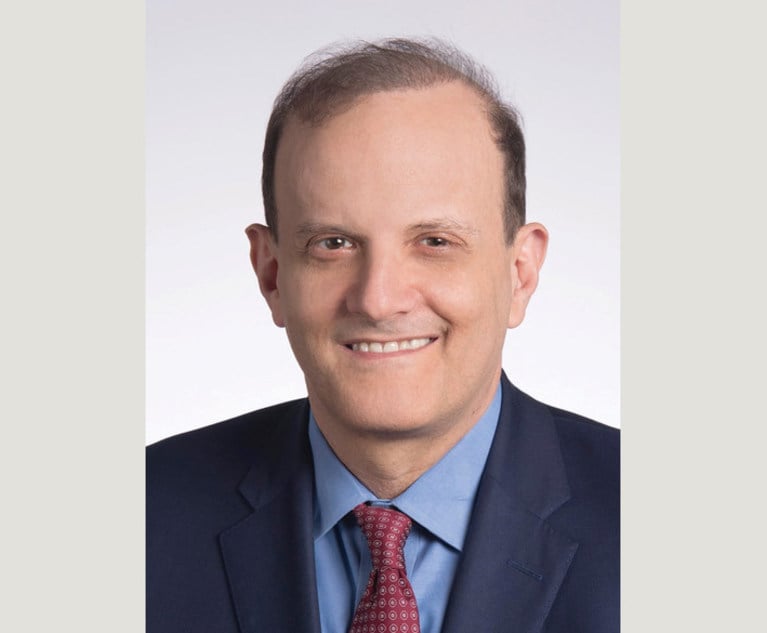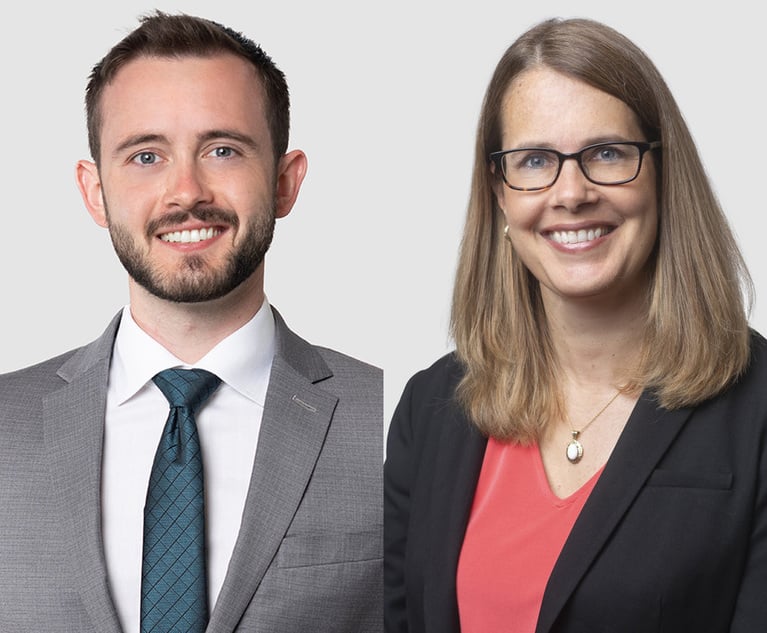The Trademark Battle of Nonprofit Dykes on Bikes
Earlier this summer in Matal v. Tam (formerly Lee v. Tam), the U.S. Supreme Court (SCOTUS) struck down the restriction on the registration of marks that “disparage” under Section 2(a) of the Lanham Act, 15 U.S.C. Section 1052(a).
November 13, 2017 at 12:25 PM
6 minute read

Earlier this summer in Matal v. Tam (formerly Lee v. Tam), the U.S. Supreme Court (SCOTUS) struck down the restriction on the registration of marks that “disparage” under Section 2(a) of the Lanham Act, 15 U.S.C. Section 1052(a). Justice Samuel A. Alito Jr. wrote unanimously for the eight justices in holding that Section 2(a)'s prohibition on disparaging registrations violates a bedrock First Amendment principle: Speech may not be banned on the premise that it expresses ideas that offend.
As a proud member of “Hooters on Scooters,” I am happy to report that this landmark ruling allowed the “Dykes on Bikes” to trademark the name of their nonprofit. The first time Dykes on Bikes, a nonprofit lesbian motorcycle organization, filed an application to register their name with the U.S. Patent and Trademark Office (uSPTO), they were denied on the grounds the name used “disparaging language.” The Dykes won their appeal, and trademarked their name in 2007, but when they attempted to register their logo, they hit the same wall of denial. They filed another appeal, during which the logo registration application was suspended pending the outcome of another case, brought by an Asian-American band called The Slants, whose case was decided this past June. The Dykes on Bikes attorneys filed an amicus brief in The Slants' case backing the band's intent to reclaim the insult and inspire those within their community rather than feel demeaned by it.
The argument in both cases was that the intent of the groups to whom the slurs apply was to redefine the meaning, turning the insults into an empowering tool to arm themselves against those who would denigrate them. For The Slants, it was to show that the shape of their eyes, which the slur “slant” is intended to diminish, is not at all something for which to be ashamed. The lead singer of The Slants said that, “growing up and the notion of having slanted eyes was always considered a negative thing … and kids would pull their eyes back in a slant-eyed gesture to make fun of us and I wanted to change it to something that was powerful, something that was considered beautiful. For the motorcycle club members, being a dyke is a point of pride, and after all, if anyone knows the definition of pride, it's the LGBTQ community.
Also problematic was the subjective nature of the refusal. Who at the PTO gets to decide what's disparaging and what's not? After all, “Queer Eye for the Straight Guy” received a trademark when it first aired in 2003. The word “queer” is another formerly derogatory term repurposed by the LGBTQ community it was meant to insult, and while there remains some debate on whether it's still a slur, a large contingent of LGBTQ people use it to describe themselves when they want a bigger label umbrella, i.e., a pansexual gender nonbinary individual; down to the Q in LGBTQ standing for either queer or questioning. So, who at the PTO decided Queer Eye was acceptable but Dyke was not?
This subjective nature of the policy at the PTO is in part what led to the Supreme Court's ruling in June 2017 that the denial of the trademark violated free speech via viewpoint discrimination. From Justice Alito's majority opinion: “With few narrow exceptions, a fundamental principle of the First Amendment is that the government may not punish or suppress speech based on disapproval of the ideas or perspectives the speech conveys. … The test for viewpoint discrimination is whether—within the relevant subject category—the government has singled out a subset of messages for disfavor based on the views expressed. … The law thus reflects the government's disapproval of a subset of messages it finds offensive, the essence of viewpoint discrimination.”
Understandably, the Dykes on Bikes members were celebratory after the SCOTUS ruling, submitting a request to fast-track their registration application on their logo once the suspension was lifted.
However, the decision is a bit of a double-edged sword. Groups like the Washington Redskins—a group not wholly made up of Native Americans—benefit from the ruling as well. In the Dykes' amicus brief for The Slants, they explain why they do not support the Washington Redskins' use of that name; because both the Dykes, The Slants and the Queer Eye for the Straight Guy, are using terms that describe the groups to which they belong. They are reclaiming language for a greater, more positively focused purpose. Empowerment. Self-confidence. Inner strength.
In their first appeal, the Dykes submitted more than two dozen expert declarations from scholars, psychologists, linguists and activists demonstrating the evolution of the word “dyke” from negative to positive associations. For a group that doesn't belong to the demographic their name describes, such as the Redskins, this reclamation simply isn't possible. Instead, they're subverting a group outside themselves by taking a negative reputation given by others and using it for their own purposes. Were a football team made up entirely of Native American athletes call themselves the Redskins, they would be participating in the same reclamation efforts as the Dykes on Bikes and The Slants. Not to mention the profits the Washington Redskins enjoy, which most assuredly are not shared with the Native American community. A similar situation was what prompted the Dykes on Bikes trademark application in the first place—a for-profit individual unassociated with their organization attempted to use the phrase for commercial purposes.
Most experts in trademark law welcomed the decision but others see potential for problems. Like any landmark ruling, one side of the argument will fear a floodgate of litigation—or in this case, a floodgates of trademark applications for all sorts of potentially offensive and hateful marks. Now that PTO no longer legally rejects trademark applications bearing derogatory names, it is up to the people applying for the trademark to use good judgment—which in today's political environment is a scary notion. But, it has long been held that the First Amendment protects free speech, even ugly, demeaning, and morally reprehensible speech.
Society has a responsibility concerning the speech we use, along with its consequences, and we will now look to society to uphold that responsibility.
Angela D. Giampolo, principal of Giampolo Law Group, maintains offices in Pennsylvania and New Jersey and specializes in LGBT law, business law, real estate law and civil rights. Her website is www.giampololaw.com and she maintains two blogs, www.phillygaylawyer.com and www.lifeinhouse.com. Contact her at [email protected].
This content has been archived. It is available through our partners, LexisNexis® and Bloomberg Law.
To view this content, please continue to their sites.
Not a Lexis Subscriber?
Subscribe Now
Not a Bloomberg Law Subscriber?
Subscribe Now
NOT FOR REPRINT
© 2025 ALM Global, LLC, All Rights Reserved. Request academic re-use from www.copyright.com. All other uses, submit a request to [email protected]. For more information visit Asset & Logo Licensing.
You Might Like
View All
Avoiding Conflict When Relating Advice to an Adverse Party to Facilitate a Client Matter
4 minute read

Employment Law Developments to Expect From the Second Trump Administration
8 minute read
Wholesale Real Estate Transaction Transparency and Protection Act Takes Effect Jan. 4: What You Need to Know
Trending Stories
- 1The Fearless Forecaster’s Employment Law Predictions for 2025
- 2Judicial Conference Declines Democratic Request to Refer Justice Thomas to DOJ
- 3People in the News—Jan. 2, 2025—Eastburn and Gray, Klehr Harrison
- 4Deal Watch: Latham, Paul Weiss, Debevoise Land on Year-End Big Deals. Plus, Mixed Messages for 2025 M&A
- 5Bathroom Recording Leads to Lawyer's Disbarment: Disciplinary Roundup
Who Got The Work
Michael G. Bongiorno, Andrew Scott Dulberg and Elizabeth E. Driscoll from Wilmer Cutler Pickering Hale and Dorr have stepped in to represent Symbotic Inc., an A.I.-enabled technology platform that focuses on increasing supply chain efficiency, and other defendants in a pending shareholder derivative lawsuit. The case, filed Oct. 2 in Massachusetts District Court by the Brown Law Firm on behalf of Stephen Austen, accuses certain officers and directors of misleading investors in regard to Symbotic's potential for margin growth by failing to disclose that the company was not equipped to timely deploy its systems or manage expenses through project delays. The case, assigned to U.S. District Judge Nathaniel M. Gorton, is 1:24-cv-12522, Austen v. Cohen et al.
Who Got The Work
Edmund Polubinski and Marie Killmond of Davis Polk & Wardwell have entered appearances for data platform software development company MongoDB and other defendants in a pending shareholder derivative lawsuit. The action, filed Oct. 7 in New York Southern District Court by the Brown Law Firm, accuses the company's directors and/or officers of falsely expressing confidence in the company’s restructuring of its sales incentive plan and downplaying the severity of decreases in its upfront commitments. The case is 1:24-cv-07594, Roy v. Ittycheria et al.
Who Got The Work
Amy O. Bruchs and Kurt F. Ellison of Michael Best & Friedrich have entered appearances for Epic Systems Corp. in a pending employment discrimination lawsuit. The suit was filed Sept. 7 in Wisconsin Western District Court by Levine Eisberner LLC and Siri & Glimstad on behalf of a project manager who claims that he was wrongfully terminated after applying for a religious exemption to the defendant's COVID-19 vaccine mandate. The case, assigned to U.S. Magistrate Judge Anita Marie Boor, is 3:24-cv-00630, Secker, Nathan v. Epic Systems Corporation.
Who Got The Work
David X. Sullivan, Thomas J. Finn and Gregory A. Hall from McCarter & English have entered appearances for Sunrun Installation Services in a pending civil rights lawsuit. The complaint was filed Sept. 4 in Connecticut District Court by attorney Robert M. Berke on behalf of former employee George Edward Steins, who was arrested and charged with employing an unregistered home improvement salesperson. The complaint alleges that had Sunrun informed the Connecticut Department of Consumer Protection that the plaintiff's employment had ended in 2017 and that he no longer held Sunrun's home improvement contractor license, he would not have been hit with charges, which were dismissed in May 2024. The case, assigned to U.S. District Judge Jeffrey A. Meyer, is 3:24-cv-01423, Steins v. Sunrun, Inc. et al.
Who Got The Work
Greenberg Traurig shareholder Joshua L. Raskin has entered an appearance for boohoo.com UK Ltd. in a pending patent infringement lawsuit. The suit, filed Sept. 3 in Texas Eastern District Court by Rozier Hardt McDonough on behalf of Alto Dynamics, asserts five patents related to an online shopping platform. The case, assigned to U.S. District Judge Rodney Gilstrap, is 2:24-cv-00719, Alto Dynamics, LLC v. boohoo.com UK Limited.
Featured Firms
Law Offices of Gary Martin Hays & Associates, P.C.
(470) 294-1674
Law Offices of Mark E. Salomone
(857) 444-6468
Smith & Hassler
(713) 739-1250





